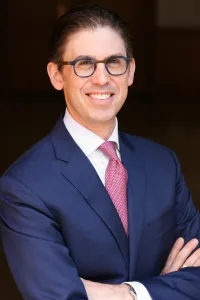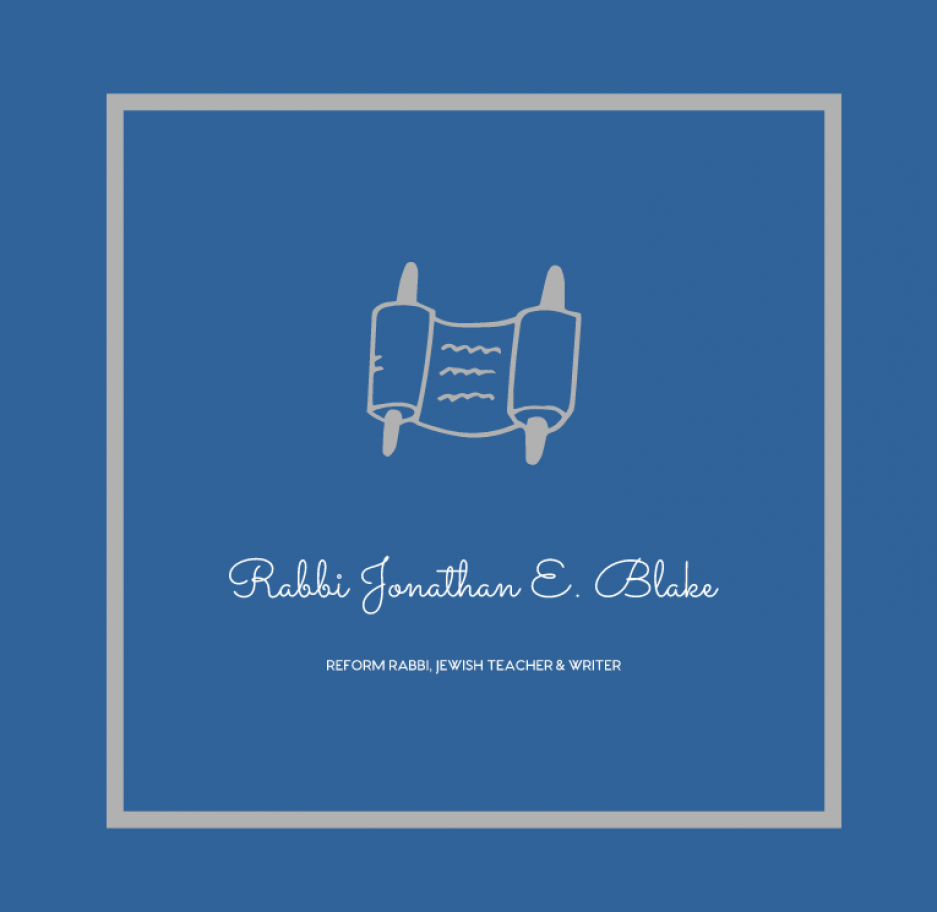“OLD AGE AIN’T NO PLACE FOR SISSIES”
WESTCHESTER REFORM TEMPLE, NOVEMBER 11, 2017
RABBI JONATHAN BLAKE
I turned forty-four in September. There are lots of ways to think about the significance of this age—half as many years as a piano has keys; the total lifespan of Billie Holiday, F. Scott Fitzgerald, Jackson Pollack and Henry David Thoreau; and twice the lifespan of Buddy Holly—but by any reasonable measure, I am now officially, incontrovertibly, middle-aged.
It is a status I hope to enjoy for some time, having spent most the last eighteen years fielding the apparent knee-jerk reaction that people have upon meeting me for the first time, namely, “You look too young to be a rabbi.” To them, meaning to all of you, I can now proudly declare that I am not in fact young, but rather middle-aged, and that the math backs me up.
Of course, middle age was never meant to last, any more than is youth. I fully expect that in ten years, at the age of 54, I’ll be past my statistical middle. That is to say, 108 would be a reach.
I do intend, however, to enjoy middle age for as long as I can—whatever its numerical boundaries may be—because we all know what comes after middle age, and that’s “old.”
“Old,” my colleague Rabbi Stephen Pearce observes, is something that “most people want to become, but almost no one wants to be.” The search for the proverbial fountain of youth refers not only to the apocryphal story of the Spanish explorer Juan Poncé de Leon; it also describes a universal human quest. Who among us has not wanted to turn back the clock; to halt the march of time; to reverse the inexorable ravages of age; to forestall the inevitable loneliness of losing loved ones? In so many human stories I hear an echo of a verse from Psalm 71, repurposed in the Shma Koleinu prayer on Yom Kippur: Al tashlicheini l’eit ziknah…. “Do not cast me out in old age!”
My rabbinic mentor, Les Gutterman of Providence Rhode Island, retired a couple of years ago. Les was my senior rabbi when I started out as an indisputably (you might say, irresponsibly) young assistant rabbi, at the age of 26. Now in his seventies, Les had served one congregation with distinction for forty-five years, and was ready to hang up his yarmulke. As Rabbi Gutterman contemplated this new phase of his life, he told me:
“You know, Jon, two things happen to you when you begin to get old. One is you become forgetful, and the other, I don’t remember.”
I also learned from him that:
You are old when your knees buckle and your belt doesn’t.
You are old when the gleam in your eyes is the sun hitting your trifocals.
You are old when your back goes out more often than you do.
You are old when you sink your teeth into your dinner and they stay there.
You are old when you hear your favorite songs in an elevator.
You are old when you spot that first gray hair… on your kid.
You are old when Happy Hour is a nap.
Okay, one more, last one, I promise:
You are old when you can remember when the Dead Sea was merely sick.
A quote attributed to Bette Davis summarizes: “Old age ain’t no place for sissies.”
Today, the question of aging takes on unprecedented urgency. There are now eight times as many people ages 65-74 as there were in in 1900; the number of 75-84 year olds is 17 times larger; and the 85-and-up population is nearly 40 times larger. By the year 2030, it is projected that America will have more than 70 million citizens over the age of 65, a figure with dramatic consequences for the population most in need of healthcare and eldercare services, as well as for America’s aging labor force.
It seems fitting that I would speak about aging tonight of all nights, first, because on Chai Society Shabbat we honor WRT congregants who are (I take pains to note) not necessarily “old,” but “of long vintage.” Chai, which means life, also denotes the number eighteen; tonight we recognize those who have affiliated with WRT for eighteen years and more, with a special blessing of induction to the new Class of 1999.
Just as much, this topic seems apropos tonight of all nights, because the theme of aging finds eloquent expression in this week’s Torah portion, which also includes the word “Chai” in its title, Chayei Sarah, meaning “the life of Sarah,” a phrase that, ironically, describes the matriarch’s death.
In short, much of this week’s parasha addresses getting old. Sarah, the opening verse tells us, goes to her eternal rest at the age of 127 years, and we will eventually learn that Abraham, who was ten years her elder, still has another 38 years to go before he dies at the age of 175, at the end of the parasha.
What’s more, Abraham and Sarah have hardly spent their golden years in a retiring state of mind. Their journey from their homeland begins when Abraham is 75. Abraham was 100 and Sarah 90 when God told them to get ready for the maternity ward. Their baby, Isaac, would grow up, only to be almost sacrificed by his father who apparently was still able-bodied enough to make a three-days journey by donkey, carry a load of firewood, and hold a knife steady enough to make God worry that he was going to go through with it. Perhaps it is no coincidence that Sarah dies in the very first verse after the binding of Isaac, which falls at the end of last week’s portion.
In any case, a lifespan of 127 years is nothing to sneeze at. Consider that this past August, the world’s then oldest living person, Auschwitz survivor Israel Kristal, died one month shy of his 114th birthday, and the lifespan of an Abraham or a Sarah seems all-the-more remarkable.
Still, Abraham and Sarah are hardly the first, or only, biblical figures to reach old age. Here are some of the Bible’s other renowned geriatrics: there’s Adam, who lived to 930. Noah outlasts Adam by a full 20 years. And Methuselah lived to 969. That’s downright ancient!
But what’s amazing is that none of these extraordinary figures is ever described with a critical Hebrew word that appears for the first time in this week’s Torah portion.
That word is zakein, which, generally speaking, means “old.” Genesis chapter 24 begins, V’Avraham zakein, ba ba-yamim. “Abraham was old, well advanced in years…” (24:1). The term zakein comes up again when Abraham’s own son Isaac is dying, and many times over throughout the Hebrew Bible, including at the deathbed scene of King David, which begins this week’s Haftarah:V’ha-melekh David zakein, ba ba-yamim, “King David was old, well advanced in years…” (I Kings 1:1). David is only 70 when he dies.
So what’s the difference? Why do we have these superannuated characters who are never called zakein, “old?” And why do we reserve the term zakein for figures who, while possibly up there in years, still come nowhere close to the lifespan of Methuselah?
One answer is provided in a Rabbinic interpretation of zakein as referring to “a wise person who knows how to season wisdom with reason and good sense” (paraphrasing the commentary of Pinhas Kehati to Pirkei Avot, 5:21). In other words, zakein isn’t so much about chronological age as it is about attaining the qualities of emotional and spiritual maturity. Indeed, a popular folk etymology explains that the Hebrew word zakein is an acronym for “Zeh sh’kaneh chochmah,” meaning, “One who has acquired wisdom.”
This may explain why the Torah insists that a person who has attained the status of Zakein deserves our respect. The Book of Leviticus instructs: “v’hadarta p’nei zakein,” literally, “Show honor to the face of the zakein” (Lev. 19:32). It makes sense if zakein denotes the accumulation of wisdom more than the accumulation of years. After all, as the poet Anthony Hecht reminds us, “Merely to have survived is not an index of excellence.” Judaism demands respect for our elders not because it’s inherently valuable to live to old age, but rather because our elders embody and transmit something invaluable to the next generation.
And so we must infer that Judaism instructs us in an attitude toward aging that combines an acceptance of time’s unrelenting advance with an openness to the possibility for intellectual stimulation, emotional growth, and spiritual evolution that each passing day brings.
In other words, when it comes to aging, attitude counts more than chronology. Some years ago, Rabbi Pearce, whom I quoted earlier, visited a woman who was celebrating her 99th birthday. As he left, he cheerfully said, “I hope I will be able to come back next year to celebrate your 100th birthday with you.” “Why shouldn’t you?” she asked. “You look perfectly healthy to me” (Stephen S. Pearce, “Adding Life to Years,” published on reformjudaism.org, November 6, 2017).
A science writer named David Quammen once observed, “Somewhere between the ages of thirty and forty each of us comes to the shocking realization that a lifetime is not infinite. The world is big and rich, options are limited. Once that dire truth has revealed itself, everything afterward becomes a matter of highly consequential choices. Each hour of cello practice is an hour that I might have been spending rereading Dostoevski but wasn’t. Every day of honest work is a day of lost skiing, and vice versa; every inclination is also an exclusion, every embracement is also a casting aside, every do is also a didn’t. Then presto: Time is up, and each didn’t goes down on the scroll as a never did.” With something like this in mind do I imagine the Biblical Psalmist writing: “Teach us to make our days count, so that our hearts might grow in wisdom” (Quammen, David. The Flight of the Iguana: A Sidelong View of Science and Nature. New York: Simon and Schuster, 1998. p. 10).
The attitude toward aging that I most admire was described by Mitch Albom in his beloved book Tuesdays with Morrie:
Morrie says:
“If you’re always battling against getting older, you’re always going to be unhappy, because it will happen anyhow…. This is your time to be in your thirties. I had my time to be in my thirties, and now is my time to be 78. You have to find what’s good and beautiful in your life as it is now….
“The truth is part of me is every age. I’m a three-year-old, I’m a five-year-old, I’m a 37-year-old, I’m a 50-year-old. I’ve been through all of them and I know what it’s like. I delight in being a child, when it’s appropriate to be a child. I delight in being a wise old man when it’s appropriate to be a wise old man. Think of all I can be! I am every age up to my own… How can I be envious of where you are – when I’ve been there myself?” (Albom, Mitch. Tuesdays with Morrie. New York: Doubleday, 1997. pp. 119-121).
And to that, dear friends, we can all say: Amen.

